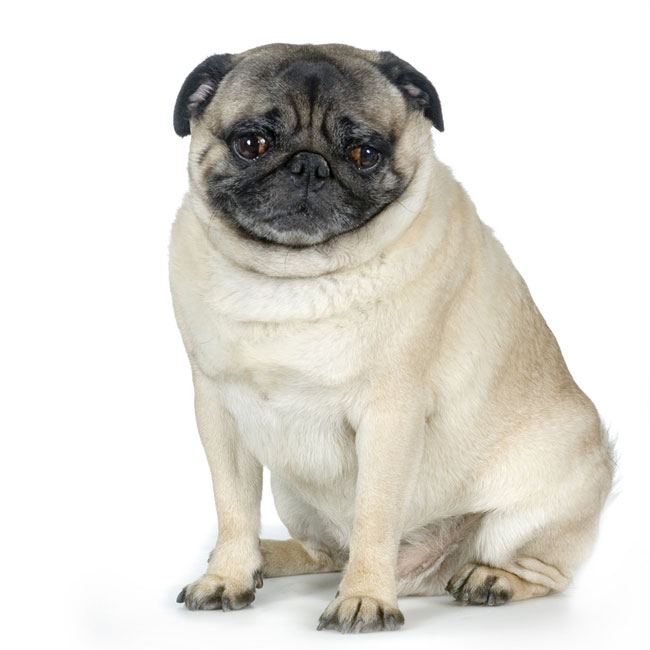Obesity Epidemic Strikes Pets, Too

American pets are facing an obesity epidemic, underscoring the belief that pets and pet owners tend to resemble one another. One-third of dogs in this country are overweight or obese, according to a study published in the April issue of American Journal of Veterinary Research. Previous studies found a third of cats are overweight or obese, too. Obesity is by far the most common condition that veterinarians see, said veterinarian and nutritionist Sean Delaney of Davis Veterinary Medical Consulting in California. And the widening waistlines of cats, dogs, rabbits and horses are a big problem that's just as unhealthy as obesity in humans.
Overweight pets suffer from diabetes and joint diseases, and excess weight can lead to fatal illnesses. Similar to humans, the weight gain can be blamed partly on genes and the environment. But in the case of pets, veterinarians say, the sedentary lifestyle and fatty foods provided by humans is the main culprit. "Animals eat too much of too-rich food and they are not active enough," said Philip Johnson, professor of veterinary medicine and surgery at the University of Missouri-Columbia. "A similar combination applies to people." Fat food Thanks to pet food manufacturers, house pets' plates are full of cheap, tasty food. Since animals don't have brand loyalty, owners rely on their pets' responses to flavor to tell them what to shop for. Veterinarians say many companies strive to produce cheap and flavorful food rather than nutritional food, to encourage a feeding frenzy. But cutting back the calories can help keep your best friend around a little longer. A new study finds that restricting a dog's diet can extend its lifetime by almost 2 years. Dogs eating 25 percent less than their canine cohorts were less likely to have diabetes and osteoarthritis. The findings are published in the April 20 issue of the Journal of Proteome Research. Nutrition is also lacking in most food fed to horses. Hay may be for horses, but feeding them grasses genetically modified to fatten cattle leads, not surprisingly, to fatter horses. Carbohydrate-rich grains aren't a nutritional option either. "It's like feeding candy to a diabetic child," Johnson told LiveScience. Lazy lifestyles To make matters worse, animals are also missing exercise in their daily life these days. Pets adhere to the sedentary lifestyle led by humans . Meanwhile, owners' chaotic schedules can cause animals stress. Some indoor cats don't acclimate well to living in confined spaces, said clinical veterinary nutritionist Tony Buffington. In the Veterinary Hospital at Ohio State University, Buffington and his colleagues have come up with strategies to keep cats active, even in a studio apartment. The suggestions can be found here. Getting your cat off the couch can keep it from becoming resistant to insulin, a condition that leads to diabetes and joint disease. In his clinic, Johnson sees obese horses suffering from insulin resistance and laminitis, the painful front hoof condition that felled 2006 Kentucky Derby winner Barbaro. Additional weight on the legs tears connective tissue and breaks bone, which tears through the hooves. With no treatment for the disease available, sick horses must often be put down. What you can do Johnson has noticed owners of his equine patients are becoming more aware of animal obesity and its health hazards. To keep your animals at a healthy weight, Buffington has these tips:
- Control portions. Feed your pets according to their body conditions score, which can be found online.
- Go for a walk. Increase the animal's activity, but do so gradually. If you and your pet have been spending most of your free time on the couch, start out slowly and make sure you're both having fun. One study found that owners who exercised with their pets had more effective workouts than people exercising alone.
- Let animals be animals. Hide treats for your cat around the house so it can put its hunting skills to work. Take your dog off its leash in a safe place outdoors and watch Fido's spirited sprint.
Similar to an overweight human body, shedding a few pounds can bring great improvements to an animal's health. But the best way to avoid obesity and related health problems is to never allow a pet to become overweight in the first place. "It's easier to prevent the weight from going on than to take it off," Buffington told LiveScience.
- Pet Food Deaths Baffle Scientists
- Move Over, Rover: Robotic Pet Can Be Best Friend
- Dogs Get Found, Cats Stay Lost
Sign up for the Live Science daily newsletter now
Get the world’s most fascinating discoveries delivered straight to your inbox.









